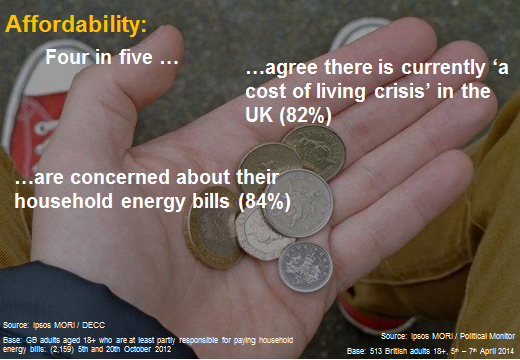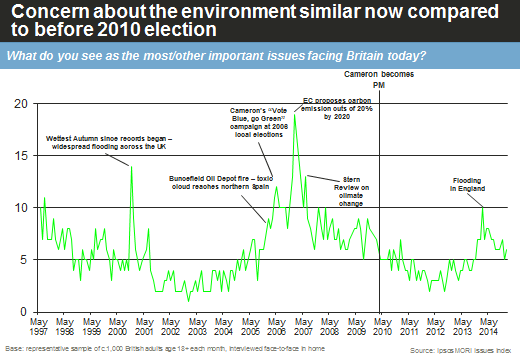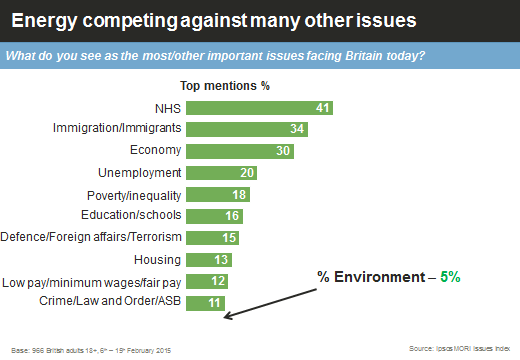Energy policy after the General Election
In March 2015, Antonia Dickman, Joint Head of Environment Research at Ipsos, addressed the Parliamentary Group for Energy Studies (PGES) on priorities for energy consumers and the possible implications for policy makers after the 2015 General Election. Antonia and Stefan Durkacz, Research Manager in the Environment Research SBA, subsequently wrote an article based on the presentation. An edited version appeared in the PGES journal 'Energy Focus'. The full version of the article is reproduced below.
Government and industry are clear about the energy challenges facing the UK over the next few years and decades. Whoever forms the next Government after May will face challenges in:
- Ensuring security of supply;
- Ensuring affordability and tackling fuel poverty;
- Delivering a low carbon economy;
- Mitigating climate change; and
- Helping to ensure customers can access a competitive and transparent energy industry.
But what is the public’s take on these challenges as we approach the General Election, what are their concerns and priorities around energy, and what implications does this have for prospective policymakers?
A ‘cost of living crisis’?
The so-called ‘cost of living crisis’ has already emerged as a key potential election battleground. Ipsos research shows that voters are feeling the squeeze and energy prices are central to this.

Ipsos’s polling following the 2013 party conference season found Labour’s proposed energy price freeze, preventing suppliers from raising prices for two years, resonated with voters. If the current oil price slump continues it will be interesting to see whether people feel the reductions are being passed on to them, and how this affects views of affordability and the price freeze policy.
Do consumers feel we have a competitive and transparent energy industry?
Ipsos research on behalf of Energy UK found fewer than half (45%) of British adults trust their supplier to provide them with value for money, and only 50% trust them to be open and transparent. Over 2014 this research did, however, record improvement in customer ratings of the ease of dealing with their supplier overall and trust in suppliers to provide a service that meets customers’ needs[1].
Negative views of some elements of the industry are also not confined to the public. Ipsos’s MP survey found the majority of MPs did not trust energy companies to protect vulnerable consumers from high prices (80%), to offer genuine competition (73%), or provide clear information to help consumers choose between suppliers (86%). Working with the industry to improve perceptions of competitiveness and transparency will be a major challenge for the next Government.
To what extent do the public care about energy security and climate change?
Consumers are also thinking beyond their own homes. Ipsos’s research reveals high levels of public concern about the UK’s energy security, with 81% agreeing that the UK risks becoming more dependent on imported energy, and 78% concerned about fossil fuels running out[2]. Indeed, when asked to name the three most important environmental issues facing the country, the most commonly given (unprompted) responses related to “future energy sources and supplies”.
While public concern about climate change has been falling over recent years (from 82% concerned in 2005 to 60% concerned in 2013), Ipsos’s most recent research for Cardiff University finds evidence that it’s now on the rise again – standing at 68% in 2014[3].
Public concern about the environment is sensitive to extreme weather events, as trend data from Ipsos’s monthly Issues Index reveals. Ipsos’s research with flooded householders found them more likely to be concerned about climate change.

The public understand the link between energy consumption and climate change. Ipsos research for Chatham House found at least four in five think burning fossil fuels in power stations (87%), industry and manufacturing (85%), and heating and cooling their homes (80%) contribute a lot or a moderate amount to climate change[4].
So how accepting are the public of policies to tackle these challenges?
It’s evident that the public are concerned about energy on a number of fronts; however this does not necessarily translate into support for policies or understanding of the difficult decisions that need to be made. While the public tend to support renewables, there are signs of this support eroding slightly. Support for solar fell from 88% in 2010 to 77% in 2013 and from 82% to 64% over the same period in relation to wind. And support does not necessarily mean a willingness to pay - three in five would not support tax increases to pay for more renewable energy.
Among the public, the jury is also still out on nuclear with 42% supporting the replacement of nuclear power stations in Britain and 33% opposing. Education and reassurance on safety will be key to convincing people: 55% agree that “if we had safer nuclear power stations, I’d be prepared to support new ones being built”.
And what are the public willing to do themselves to tackle these challenges?
So, the public accept our energy system, and our use of it, needs to change. But where do they think the responsibility lies for driving the necessary transformations? The public place this responsibility firmly with Government (54% compared to 16% saying energy suppliers should be mainly responsible and 13% placing this responsibility on individuals). That said, Ipsos research for DECC shows the majority of the public claim (74%) to have taken action to reduce the amount of energy they use at home and most demonstrate an appetite to do more. Smart meters are seen by many as a way to further reduce waste and cost – 30% say (unprompted) the greatest potential benefit of smart metering will be help with budgeting[5].
Challenges for policy makers
Energy and environment are competing in voters’ minds with a great many other issues, as Ipsos’s Issues Index illustrates. Whilst people are concerned about climate change and energy security, they are likely to put a number of other issues ahead, presenting a challenge in getting the public to focus on energy.

Who delivers messages around energy challenges and the potential solutions also matters. The public may have low levels of trust in energy suppliers, but according to Ipsos’s Veracity Index they feel similarly about politicians, ministers and journalists (between seven and eight in ten say they ‘do not trust these types of people to tell the truth’).
Overall, the public’s priorities are simple: a secure, affordable, and fairly priced supply. Getting there will be more difficult and involves building trust and confidence in the message and the means.
[1] Full research details and report: https://www.ipsos-mori.com/researchpublications/publications/1720/Research-for-Energy-UK.aspx
[2] Full research details and report: https://www.ipsos-mori.com/researchpublications/researcharchive/2620/Climate-Change-Still-High-on-Publics-Agenda.aspx
[3] Full research details and report: https://www.ipsos-mori.com/researchpublications/researcharchive/3522/Public-perceptions-of-climate-change-in-Britain-following-the-winter-201314-flooding.aspx
[4] Full research details and report: https://www.ipsos-mori.com/researchpublications/researcharchive/3488/Diet-and-climate-change.aspx
[5] Full research details and report: https://www.ipsos-mori.com/researchpublications/researcharchive/3033/Public-Awareness-Attitudes-and-Experience-of-Smart-Meters.aspx



